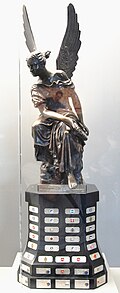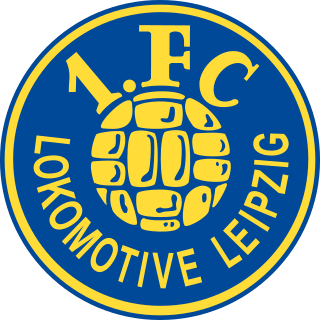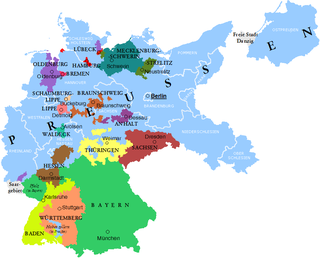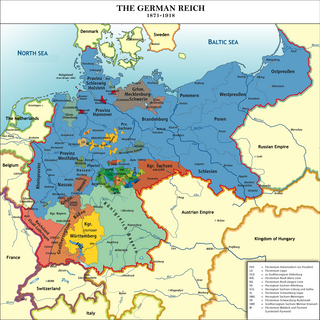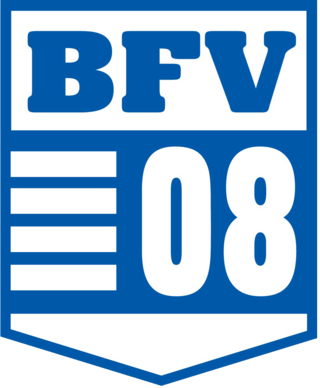Champions
Early German football championships (1903–32)
The new English game of football quickly caught on in late 19th-century Germany, which had previously been a nation of gymnasts and fencers. The earliest attempt at organizing some form of national championship came in 1894, when city champions Viktoria 89 Berlin invited FC Hanau 93 to play a challenge match. The Hanauers were unable to afford the cost of the trip and so were unable to take up the invitation. [1] In 2007, the 1894 final was replayed and Viktoria were crowned the official 1894 champions. [6]
After its formation in 1900, the DFB began to establish its authority over the myriad city and regional leagues springing up throughout the country and organized the first officially recognized national championship in 1903.
The prize of German football was the Viktoria, a trophy statue of a seated Roman goddess of victory, donated by the committee that organized German participation in the 1900 Olympic Games in Paris – and originally intended to be shared with teams playing the rugby version of football. [2] The formation of the DFB helped establish for the first time a clear divide between association football and its close cousin.
To qualify for the German championship finals, a club had to win one of the regional championships, which, in some cases, predate the national one. Those were:
- Southern German football championship – formed in 1898
- Brandenburg football championship – formed in 1898
- Central German football championship – formed in 1902
- Western German football championship – formed in 1903
- Northern German football championship – formed in 1906
- South Eastern German football championship – formed in 1906
- Baltic football championship – formed in 1908
One other regional championships briefly existed:
- March football championship – existed from 1903 to 1911
From 1925 onwards, the runners-up of those competitions were also qualified for the German championship finals, which had been expanded to sixteen clubs. The two strongest regions, South and West were also allowed to send their third-placed team. This system of regional championships was abolished in 1933 and superseded by the Gauliga system.
German football championships in Nazi Germany (1933–45)
With the beginning of the 1933–34 season, top-flight German football was reorganized into 16 regional Gauligen with each of these leagues sending their champion to the national playoffs. [5] New Gauligen were created as the Reich expanded its border through the Anschluss with Austria. This expanded the national championship competition with the addition of regional champions from the new circuits. [5] It also introduced previously foreign clubs into German domestic competition where Viennese Austrian sides made a notable impression. Competition during the war was also characterized by the formation of military-based clubs including the Luftwaffe side LSV Hamburg which appeared in the era's last national championship match at the end of the 1943–44 season. [5] Unlike the United Kingdom, where play was suspended early on, national football competition continued on in Germany in some form through the course of the war. Play finally collapsed as the war drew to its conclusion and no champion was declared in 1944–45.
It was also during this period that a national cup competition was introduced; the Tschammerpokal was named for Reichssportführer (Sports Chief of the Reich) Hans von Tschammer und Osten and is predecessor to the modern-day DFB-Pokal (German Cup). The first cup competition was staged in 1935 and won by 1. FC Nürnberg. [5]
Key
| † | Champion also won Tschammerpokal |
| Season [7] | Champions [7] | Score [7] | Runners-up [7] | Venue |
|---|---|---|---|---|
| 1933 | Fortuna Düsseldorf (1) | 3–0 | Schalke 04 | Köln |
| 1934 | Schalke 04 (1) | 2–1 | 1. FC Nürnberg | Berlin |
| 1935 | Schalke 04 (2) | 6–4 | VfB Stuttgart | Köln |
| 1936 | 1. FC Nürnberg (6) | 2–1 ( a.e.t. ) | Fortuna Düsseldorf | Berlin |
| 1937 | Schalke 04 (3) † | 2–0 | 1. FC Nürnberg | Berlin |
| 1938 | Hannover 96 (1) | 3–3 ( a.e.t. ) 4–3 ( a.e.t. ) | Schalke 04 | Berlin |
| 1939 | Schalke 04 (4) | 9–0 | Admira Wien | Berlin |
| 1940 | Schalke 04 (5) | 1–0 | Dresdner SC | Berlin |
| 1941 | Rapid Wien (1) | 4–3 | Schalke 04 | Berlin |
| 1942 | Schalke 04 (6) | 2–0 | First Vienna | Berlin |
| 1943 | Dresdner SC (1) | 3–0 | FV Saarbrücken | Berlin |
| 1944 | Dresdner SC (2) | 4–0 | LSV Hamburg | Berlin |
| 1945 | Suspended due to World War II | |||
German football championships from post-war to the Bundesliga (1946–63)
In the immediate aftermath of World War II, German football was in complete disarray. Occupying Allied authorities ordered the dissolution of most organizations in the country. [1]
However, many football clubs were soon re-established and new sides formed; play was tentatively resumed. By 1948, a new first division league structure, the Oberligen, was in place in most of the Western zone of occupation. The restored competition maintained the German game's historical practice of play in regional leagues. An exception was in French-occupied Saarland where attempts by France to annex the state were manifested in the formation of a separate, but short-lived, football competition that staged its own championship. Saarland briefly had its own representation under FIFA, forming Olympic and World Cup sides, before re-joining German competition in 1956. [1]
In the Soviet-occupied East zone, a more enduring separation took place that was not mended until the reunification of Germany in 1990. As a result, Eastern-based clubs did not take part in the German national championship under the DFB, vying instead for a different prize. The country's capital city of Berlin was similarly divided and clubs based in West Berlin took part in western-based competition. [1]
The Viktoria disappeared at war's end, although it would eventually reappear and be held in East Germany. A new trophy – the Meisterschale – was introduced in the west in 1949. The first post-war champions were 1. FC Nürnberg (2–1 over 1. FC Kaiserslautern in Köln) who were also, coincidentally, the first champions following World War I. [5]
Over time, the notion of professionalism – long anathema to German sports – made inroads in the country. A consequence of this was that by 1956, a distinct national amateur championship was established, open to teams playing below the Oberliga level in second- and third tier leagues.
| Season [7] | Champions [7] | Score [7] | Runners-up [7] | Venue |
|---|---|---|---|---|
| 1946–1947 | Suspended – Post-war regional play only | |||
| 1948 | 1. FC Nürnberg (7) | 2–1 | 1. FC Kaiserslautern | Köln |
| 1949 | VfR Mannheim (1) | 3–2 ( a.e.t. ) | Borussia Dortmund | Stuttgart |
| 1950 | VfB Stuttgart (1) | 2–1 | Kickers Offenbach | Berlin |
| 1951 | 1. FC Kaiserslautern (1) | 2–1 | Preußen Münster | Berlin |
| 1952 | VfB Stuttgart (2) | 3–2 | 1. FC Saarbrücken | Ludwigshafen |
| 1953 | 1. FC Kaiserslautern (2) | 4–1 | VfB Stuttgart | Berlin |
| 1954 | Hannover 96 (2) | 5–1 | 1. FC Kaiserslautern | Hamburg |
| 1955 | Rot-Weiss Essen (1) | 4–3 | 1. FC Kaiserslautern | Hannover |
| 1956 | Borussia Dortmund (1) | 4–2 | Karlsruher SC | Berlin |
| 1957 | Borussia Dortmund (2) | 4–1 | Hamburger SV | Hannover |
| 1958 | Schalke 04 (7) | 3–0 | Hamburger SV | Hannover |
| 1959 | Eintracht Frankfurt (1) | 5–3 ( a.e.t. ) | Kickers Offenbach | Berlin |
| 1960 | Hamburger SV (3) | 3–2 | 1. FC Köln | Frankfurt |
| 1961 | 1. FC Nürnberg (8) | 3–0 | Borussia Dortmund | Hannover |
| 1962 | 1. FC Köln (1) | 4–0 | 1. FC Nürnberg | Berlin |
| 1963 | Borussia Dortmund (3) | 3–1 | 1. FC Köln | Stuttgart |
East German football championships (1950–90)
The post-war occupation of Germany by the victorious Allies eventually led to the de facto partition of the country and the emergence of two separate German states, each with its own government and institutions.
Early plans to maintain a national championship to be contested by representatives from the eastern and western halves of the country quickly fell by the wayside in the context of the Cold War. An Ostzone champion was declared in each of the 1946–48 seasons and in 1949 the first division DDR-Oberliga was established under the DFV (Deutscher Fußball-Verband der DDR) as a distinct national sport governing body. From 1950 through to 1990 an East German football champion was declared, until the eastern competition was reintegrated into the German national competition under the DFB. [1]
In the first recognized East German national championship staged in 1949, ZSG Union Halle defeated SG Fortuna Erfurt 4–1. In 1990, the last East German champion was SG Dynamo Dresden. The following season the DDR-Oberliga (I) was redesignated the Nord-Ostdeutscher Fußball Verband Oberliga and became a third tier regional division within the existing German league structure under the DFB. FC Hansa Rostock captured the title in the transitional 1990–91 season, and alongside runners-up SG Dynamo Dresden, advanced to play in the Bundesliga, thereby fully integrating former Eastern clubs into a unified German championship. [3]
The performance of various clubs is shown in the following table: [8]
Bundesliga (since 1963)
The formation of the Bundesliga in 1963 marked a significant change to the German football championship. The historical regional league and national playoff format was abandoned in favour of a single unified national league. Sixteen teams from the five Oberligen in place at the time were invited to be part of the new circuit – which also for the first time formally acknowledged the sport as professional rather than amateur. [1]
The new league adopted a round-robin format in which each team plays every other club once at home and once away. There is no playoff, with the club having the best record at the end of the season claiming the German championship. 1. FC Köln captured the first-ever Bundesliga title in the league's inaugural 1963–64 season. Since then the competition has been dominated by Bayern Munich which has taken the championship in 32 of the 60 Bundesliga seasons played to 2023.
Key
| † | Double |
| * | Treble |
